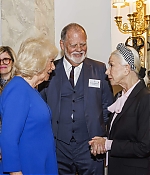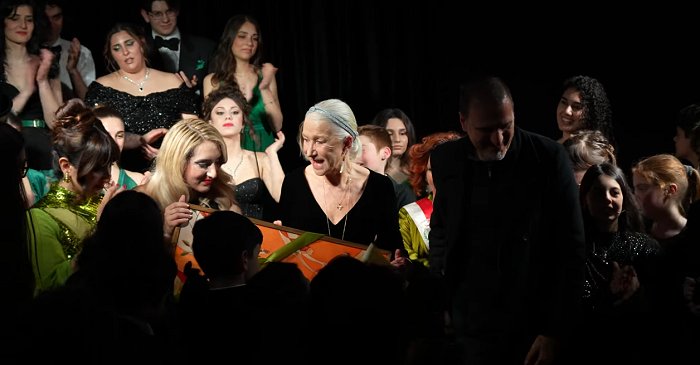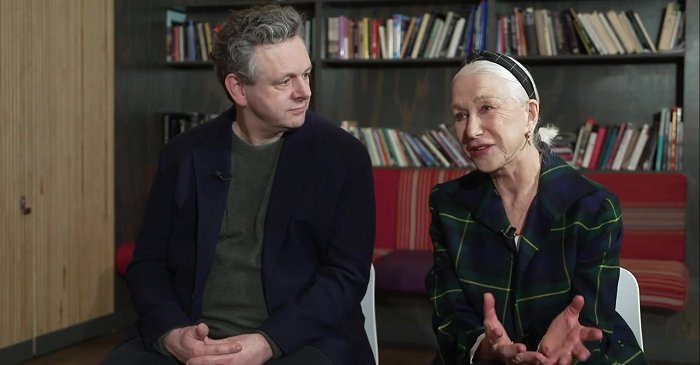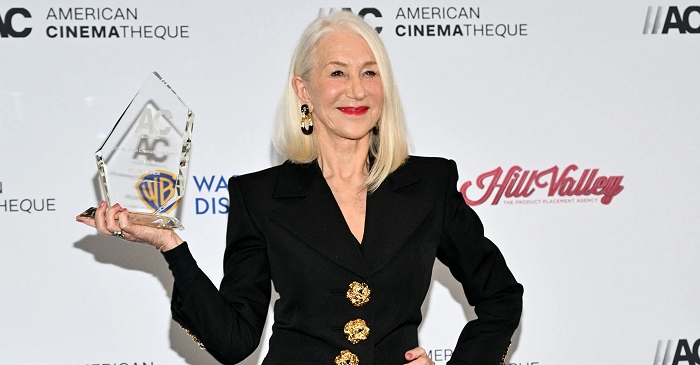
|
Welcome to The Helen Mirren Archives, your premiere web resource on the British actress. Best known for her performances with the Royal Shakespeare Company, "Prime
Suspect" and her Oscar-winning role in "The Queen", Helen Mirren is one of the world's most eminent actors today. This unofficial fansite provides you with all latest
news, photos and videos on her past and present projects. Enjoy your stay.
|
Celebrating
10 years
on the web
|
Helen Mirren has made quite a name for herself on television as a police detective battling to suppress her sexuality and natural feminity in a tough male world. She performs that task superbly, as she does most things; but it must make the role of Natalya Petrovna, who falls in love with her son’s tutor, seem remarkably liberating to her. Certainly, there are moments in “A Month in the Country” where you feel that all her emotional aspects, heart to stomach to the less mentionable glands, are overwhelming the parts above the neck.
It is an extraordinary performance and maybe even a great one: tense and feeling, yet intelligent, sharp and humorous as well. It is also the centre of a production that, thanks to Bill Bryden’s skills in the casting and directing departments, has enough all-round strength to sweep away the customary objections to Turgenev’s play. Chekhov declared it “not at all to my taste”, on the face of it a perverse, unfilial judgment, since it has pre-echoes galore of the plays he was to write 50 years later. Retainers, landowners and other representatives of the outback drift in and out, many of them exuding rural Russia’s mandatory boredom and ennui. In Rakitin, Natalya’s long-time admirer and acolyte, we get one of those ineffective middle-aged swains who were regularly to meander through Chekhov’s work with capes, canes and sunken cheeks. We even have a doctor whose all-purpose cynicism extends to his own medical skills, rather as in “The Three Sisters”.
The tone is proto-Chekhovian, too: funny and touching and sometimes both at once. Yet there are times when Turgenev’s dramatic limitations are evident. The play is long, wordy and a bit repetitive. Emotion is out-front, often spelt out in monologues rather than shown in subtler, sub-textual ways. You sometimes get the feeling that a brilliant psychologist – and Turgenev’s understanding of Natalya’s shifting emotions would qualify him for a consultancy on Harley Street tomorrow – is working in a form he has yet to master. In the theatre, “A Month in the Country” can seem like a novel in prose. But not here, not this time. Bryden’s production is simply staged, in and around a roughly timbered house and against a background of endless birch trees; and it is played with freshness and immediacy. There is only one misjudged performance, and even it is enjoyable. John Standing is too genial an actor for a doctor who conceals bitterness and spite beneath an affable eccentricity. Timothy West, radiating slit-eyed malice, glee and self-contempt, got the character’s number better in the Chichester production of 1974. Standing shouts and splutters, but is still too abrupt a jump from Jekyll to Hyde.
Never mind. John Hurt, looking like a ravaged bumble-bee in his yellow-and-black jacket, catches not only Ratikin’s ironic exhaustion but the sadness of the lover unloved. Joseph Fiennes brings a callow bashfulness to the tutor, Gawn Grainger a flumoxed decency to the role of Natalya’s husband, and Anna Livia Ryan spirit and vulnerability to her ward, Vera. But it is the woman who plays games with all of them, and even more devious ones with herself, who holds the stage. There are few more contradictory characters in drama than Natalya. She is a jealous monster, treacherous enough to lure Vera into an admission of love for the tutor and then marry her off to an elderly goon, and the most hapless of Eros’s victims. She refuses to acknowledge her feelings, faces them, renounces them, embraces them, denies them, tries to fulfill them; and sometimes, it seems, within a few sentences. All this Mirren manages, plus fear of ageing, self-mockery and a girlishness simultaneously sweet and deeply embarrassing.
There are times when she engineers tricky transitions so adroitly that only fear of missing the next sly twist stopped me cheering. I have not space to talk you through the monologue in which Natalya imagines Vera and the tutor in each other’s arms. Take my word that she stands there, alone and exposed and obliged to use a superannuated form of dramatic address; and yet she could not be more natural in her switches from pain to canny calculation to rapture to self-loathing to hope to despair.
We in the audience laughed, and it did not matter. We were touched, and that was good, too. We all knew we were watching a major actress in her prime.











